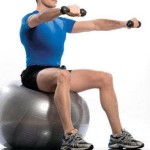This page is an archive. Its content may no longer be accurate and was last updated on the original publication date. It is intended for reference and as a historical record only. For hep C questions, call Help4Hep BC at 1-888-411-7578.
Exercise
 |
Regular Weight-Bearing exercise helps slow or prevent bone and muscle wasting that often accompanies HCV.
 |
Regular Aerobic exercise helps prevent many serious side effects of HCV by strengthening the cardio-vascular system.
Both aerobic and weight-bearing exercise are of great benefit to everyone, but in particular to those with hepatitis C and other liver diseases. Yoga, Tai chi, or Chi gong may also promote recovery from liver damage.
Exercise won’t cure hepatitis C
HCV+ individuals should consult with their doctor before commencing any exercise program.
Research suggests exercise may help prevent (or at least postpone) various complications associated with hepatitis C including:
- metabolic syndrome and diabetes
- fatty liver disease and steatosis (reduces fat thereby improving liver function)
- heart disease (improves cardio-vascular function resulting in a slower pulse rate but more blood pumped per beat)
- osteoporosis (both men and women)
- muscle-wasting, weakness, and fatigue
- irritability, depression, and other mental and brain stresses
Other benefits
We know exercise gives almost everyone an improved sense of well being and self-image, as well as improving our strength and giving us energy. People with hepatitis C are particularly in need of these! Exercise may even be linked to improving the immune system and treatment responses, but more research is needed to clarify these possible links.
Aerobic exercise vs. Weight-bearing exercise vs. Yoga/Tai chi/Chi gong
Aerobic exercise such as walking, bicycling, running, swimming, or treadmill result in cardio-vascular improvements, which puts less stress on the portal vein and the liver in general. Swimming is particularly easy on the joints, but be aware of the effects of pool chemicals on the liver (details HERE).
Weight-bearing exercise results in bone and muscle improvements, such as preventing osteoporosis, and the muscle-wasting associated with cirrhosis. This kind of exercise includes the use of dumbbells, presses, squats, lunges, curls, and presses. The use of a videotape (or – if you can afford one – a personal trainer) is recommended at first. Work out ideally at least twice a week and warm up first by stretching.
Yoga, tai chi, and chi gong poses, breathing, and movements are very gentle and low-stress. They are known to promote the general health of the organs and the whole body. This may possibly result in improved immunity and treatment success, though this has not yet been scientifically verified.
General Rules
- Always consult with your doctor before beginning an exercise program, and monitor your progress regularly.
- Combine exercise with a healthy diet.
- Drink lots of water and monitor sodium content.
- Supplement with calcium and vitamin D (consult doctor about dosages).
- NO alcohol, no steroids, no diet pills! If prednisone is prescribed, particularly ask doctor about exercise.
- Use both aerobic and weight-bearing exercise.
- Start slowly and build up over time.
- Exercise regularly.
